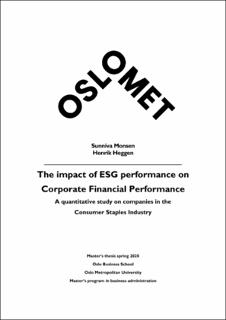The impact of ESG performance on Corporate Financial Performance - A quantitative study on companies in the Consumer Staples Industry
Master thesis
Published version
Permanent lenke
https://hdl.handle.net/11250/2824071Utgivelsesdato
2020Metadata
Vis full innførselSamlinger
Sammendrag
This study investigates the influence of Environmental, Social and Governance (ESG) performance on Corporate Financial Performance (CFP) in the Consumer Staples industry. We use two different dependent variables for financial performance: return on assets (ROA) as a proxy for short term CFP and Tobin`s q as long-term CFP. The dataset is based on 5236 firm-year observations, where 374 companies and 42 countries are represented in the years 2005-2018. The data is collected through the Thomson Reuters Eikon database. We find that ESG performance has a positive influence on CFP, both short and long term. Moreover, we find evidence that suggests that social performance has the biggest influence on CFP. In addition to the ESG-CFP relationship we want to investigate if innovation and greenhouse gas (GHG) emissions could have an influential role. We find evidence of a win-win relationship, which suggests that by reducing GHG emissions the financial performance will increase. However, we find that increasing GHG emission could affect the ESG score positively. We believe that a reason for this can be explained by firms relocating their resources towards other aspects within ESG – leading them to a better score overall. In terms of innovation, our results display insignificant results of its effect on CFP. But we find that our result leans towards innovation having a positive effect on both CFP and ESG. Overall, our results indicate that firms will gain by investing in non-financial activities, which are in line with stakeholder theory. Our goal for this thesis is to provide further perspective on the value of ESG performance, which is motivated by the increasing global focus on sustainability. We find it particularly interesting to study an industry highly important in providing us goods essential to basic living.
